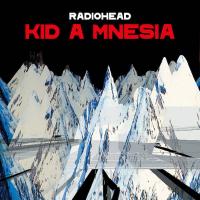Is The Kid A Mnesia Vinyl Set Worth Your Money?
While Kid A and Amnesiac are sharply ingrained in my musical DNA, I have no new contributions to those records’ analytical/critical discourse, other than to say that they’re so highly acclaimed for good reason. Therefore, I’ll skip to this package’s Kid Amnesiae bonus disc, a sort of barrel-scraping effort since Amnesiac and its B-sides used most of these sessions’ “leftovers.” There are isolated “How To Disappear Completely” and “Pyramid Song” string tracks, three untitled song fragments, alternate (mostly work-in-progress) versions of “Morning Bell,” “Like Spinning Plates,” “Fast Track,” “Fog,” and “Pulk/Pull Revolving Doors” (the latter based around “True Love Waits,” written long before its appearance on 2016’s A Moon Shaped Pool); and two previously unreleased tracks. “If You Say The Word” is a slow, full band piece with spacious guitars, deep soundscapes, and somewhat abstract lyrics—in other words, classic Radiohead. Though it was already featured in the 1998 Meeting People Is Easy documentary, the lyrically unsettling (“Blowing holes in everything/Thatcher’s children/See you on the way back down”/“You follow me around”), still-relevant acoustic track “Follow Me Around” now sees its first proper release, with a discreet vocoder brilliantly representing its paranoia. Aside from those two fully-finished “new” songs, Kid Amnesiae is a curio most rewarding for hardcore fans, an interesting glimpse into the band’s creative process but not a disc worth frequently returning to.
Now to analyzing this new vinyl set’s packaging, pressing, and sound quality. While the Kid A Mnesia standard vinyl tastefully selects bits of Stanley Donwood and Thom Yorke’s original album artwork, it doesn’t have nearly enough of it; for that, you’ll have to spend $50-ish on the 360-page, full-color Kid A Mnesia Hardback Art Catalogue. (Some of that artwork also features in Donwood’s own There Will Be No Quiet, a hardcover career retrospective which I highly recommend.) That said, the triple gatefold package (essentially a direct-to-board gatefold with a glued-in unipak) is smartly flippable/reversible (you can have either the Kid A mountains or the Amnesiac minotaur as the front), and the printed inner sleeves are relatively thin but well-printed. Still, the layout feels a bit crammed, and only the disc labels have any sort of track list.
Which brings us to the actual records. Optimal in Germany pressed the European copies (plus the super deluxe “Scarry Book” for all territories), while an unidentified US plant (probably United or Independent) pressed North American copies using metal parts or stampers from Optimal. Originally released as double 10”’s and then double 12” sets later on, Kid A and Amnesiac are now each scrunched onto single 12” LPs, half-speed cut by Barry Grint at Alchemy using 20-year-old digital masters. (Radiohead found remastering unnecessary here, and for the A Moon Shaped Pool deluxe set already chopped up their post-OK Computer master tapes.) Interestingly, the bonus disc also cut by Grint is not half-speed mastered, and has no digital mastering credit.
Because the American pressing seems to have widespread quality issues (what else would you expect?), I bought the Optimal black vinyl from Juno Records in the UK. The supposedly 140g (they feel more like 120g) discs are well pressed—perfectly flat and, save for a few brief non-fill issues, extremely quiet. The labels are a smaller 7cm size (similar to that AMSP deluxe set with the master tape fragments), partly for aesthetic and probably also to hide how much is crammed onto these sides. Kid A’s 47 minutes are too dynamic and delicate to successfully fit onto one LP, and despite the half-speed mastering (which, in short, allows for more cutting accuracy and control), this reissue’s sound greatly suffers. While soundstage width is well-defined, soundstage depth is severely flattened and dried out, and there’s loads of inner groove distortion. This particularly affects “How To Disappear Completely,” where Thom Yorke’s vocals sound muffled and the now-distorted orchestra overshadows the acoustic guitar, resulting in an icky sonic mess. Side A is cut right to the disc’s center, though the smaller labels attempt to hide that. I have the 2016 XL Recordings North American CD from the same original digital master, and while it doesn’t have as much analog “warmth”/richness, it sounds far better—spacious, more detailed, and cleaner—than this half-speed single LP cut by the usually great Barry Grint. (For Kid A, you’re probably best off with the European pressing of the 2016 XL double 12”, though I haven’t heard it myself and it currently appears backordered.)
Thankfully, the half-speed Amnesiac is better. I’m sure the 2016 45rpm double 12” cut at Abbey Road (not half-speed) beats it, though the single LP is adequate. It’s not a revelatory audiophile essential, but the sound is clear with solid bass presence and no obvious distortion (still, loud parts feel a bit restrained and overly compressed). Kid Amnesiae, cut at normal speed, also sounds fine, though it’s this set’s shortest disc by ten minutes. If you absolutely need this Kid A Mnesia vinyl set and wish to blissfully ignore my Kid A warning, avoid the US pressing at all costs and don’t spend more than $45 plus shipping on the EU pressing. Don’t feel obligated to buy it just because it exists, however, and make sure you keep your CDs too.
(Malachi Lui is an AnalogPlanet contributing editor, music obsessive, avid record collector, and art enthusiast. Follow him on Twitter and Instagram.)



